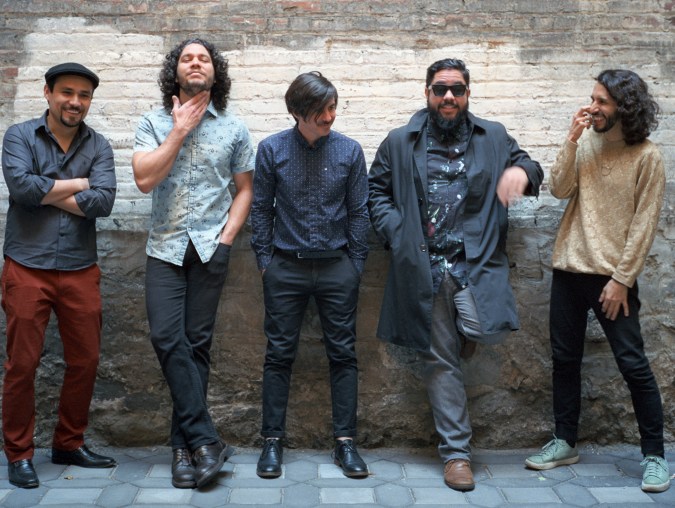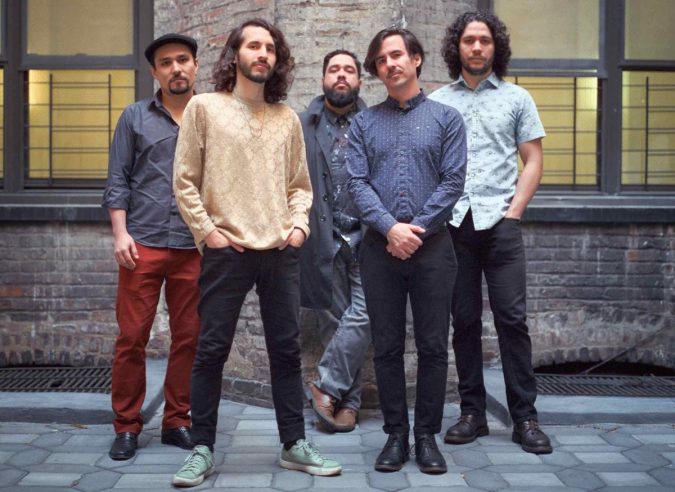Afro-diasporic music can be many things: a celebration of identity, a balm for the body and soul, a vehicle of joy or suffering. Because genres like salsa and cumbia are havens for so many people, often these artists don’t dare step outside of the music’s established parameters. Traditions become traditions for a reason.
Enter Peruvian-born multi-instrumentalist and ethnomusicologist Efraín Rozas. To him, these genres represent opportunities for reinvention. “When the band is locked tight and the crowd is feeling it – [when] we’re playing something really experimental and people are dancing and sweating, that’s incredible,” he tells Remezcla via Skype. “There’s nothing like it.” Fittingly, his project La Mecánica Popular defies expectations of what an ensemble that plays Afro-diasporic genres can do.
La Mecánica Popular takes salsa, cumbia, and bolero grooves as a template, then adds unexpected elements to the mix. On their second album Roza Cruz, Peruvian chicha guitars collide with acid-damaged synths, and everything undergoes a dub-like mutation. This practice has helped the band get co-signs from industry staples like Juanes and Fania All-Stars, who invited LMP to play their 50th anniversary show in Central Park. Plus, their 2013 self-titled album has become a fan favorite. Five years later, Roza Cruz is finally seeing the light, bringing these traditional genres to creative new heights.

The story of Roza Cruz begins in Austin, Texas in 2016. La Mecánica had been invited to play Levitation Festival, for which the band had prepared new material that mixed electronic beats with acoustic instruments. Unfortunately, inclement weather forced the festival’s cancellation. Feeling like the songs had not been developed to their fullest potential, Efraín shelved the material to work on other projects. Some time later, he revisited these tracks and thought about replacing the electronic elements with live musicians.
After rehearsing the songs, Rozas decided to record the ensemble live in the studio in a single day, all tracked straight to analog tape with no overdubs and very few changes during post-production. The results are staggering, considering there were gaps left for members to improvise and even write on the spot. “We are really happy with how it came out,” Rozas beams. “It’s a very different record from what we had done in the past; it’s the most experimental thing we have done. ”

Rozas explains that he drew inspiration from a chapter in Miles Davis’ musical career. “I had in mind this era of Miles Davis where he went electric – these really long songs with tons of improvisation but retaining a strong, danceable groove behind them,” he says. “I love playing with percussionists that come from the salsa world, because that salsa touch is unique and that can only come from playing every weekend; it’s a great dynamic. It’s beautiful. [And on top of everything] the guitar player and I added atonality, mostly textures rather than notes.”
“As Latinos, we haven’t taken that step of doing our own thing; we still stereotype ourselves a lot.”
Rozas Cruz also represents a new phase of Efraín’s career. Although in the past he dabbled a bit in the aesthetic, this new record sees him delivering something separate from your average modern cumbia release. “I go back to that era of Miles Davis when many other black musicians decided to make higher art for their communities, and not to entertain white people. [This time we wanted to] do something fun without making us more palatable to the U.S. market. I think as Latinos, we haven’t taken that step of doing our own thing; we still stereotype ourselves a lot. It’s not easy, because there are not enough spaces exclusively for us.”
As for the immediate future, Efraín has one dream to keep the momentum for Rozas Cruz going. “I want to see what people’s reaction will be, because this is very different from what we have done in the past. When we play live, there’s an instant connection with the audience through dancing. I’d love to have an experimental dance music scene, away from irony, where people can go deep. That really excites me.”
La Mecánica Popular’s Roza Cruz is out now via Names You Can Trust.




